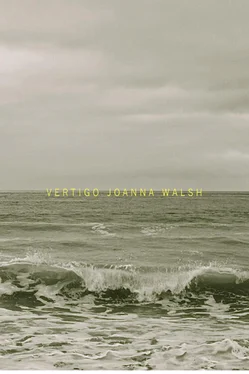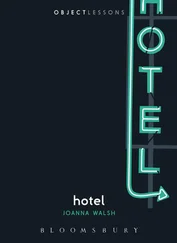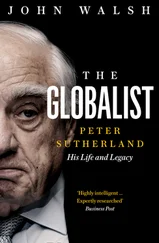I am frightened it is not worth the risk.
Nevertheless, this is our last morning.
0 YEARS/MONTHS/SECONDS
And when I came back from the funeral, I woke in the night not knowing if I were here or there, the white box of my mother’s spare room overlaying my own bedroom, laying heavy on it, and on me, heavy with her, and with my father (though you’d think he’d have been the weightier) hardly at all.
Now I am working in my kitchen. The children are somewhere about, perhaps in the living room. They bump about the house; blind lumps of my flesh, detached. They will crawl into the larder and eat sugar, they will watch too much television. They carry out my most slovenly impulses, as though I had never educated myself out of them. There are noises on the other side of the wall: people having a sing-song, tinkering on the piano. It sounds like a party, or perhaps like someone listening to a party on TV. Sometimes there are noises: a woman shouting “no!” and moaning, over the sound of a news broadcast. And that’s when I hope it’s TV, but I can’t really tell. What I like about home now is the sound of all the machines going at once: the dishwasher, the washing machine, the dryer. White noise. That’s why I work here, sitting in the kitchen, though I have a study. It helps if there’s rain.
Despite the machines, or perhaps because of them, I feel some discontent. What will shift it? Would I like a drink of water, a cup of tea, a whisky. Would I like something to eat? The mother in me offers to self-satisfy, but is never self-satisfied.
Mothers do not ask questions. Mine did not ask me anything except to verify: do you have (what I told you to bring: your raincoat, the sugar, the sewing machine)? Would you like (what you know I have in mind already: an Irish stew, a visit to a stately home, a sugar bun)? I never said, no, I would prefer a steak, to go to a club, a wafer biscuit, or really, nothing, nothing at all . I seldom said, no, I have brought: a sunhat, the pepper, a paper shredder. I usually brought what I knew she would ask for, because she had already told me to bring it, and it was the object, not the question, that had to be met.
What would have happened if, one day, I had not?
I get the tin out of the cupboard, open it, and cut myself a slice of chocolate cake. My mother had a lifetime of making cake, and I have learned from her. She always asked me if I wanted cakes. “I live on my own now,” I said. She made them anyway. They sat in my cupboard for weeks before I scraped them into the bin. This cake is rich and dark. It crumbles like soil. It tastes a little like soil.
And here she is, surprisingly, or perhaps unsurprisingly, unearthly, less substantial than she ever was, being the one who made the cakes but seldom ate them: a minute on the lips, a lifetime on … well that hardly matters any more. Mother is where we put things we don’t like. I must remember, I think, as always, to judge her less harshly this time.
But I am looking at her buttons, not her eyes. She has been talking for a while and it has been difficult for me to look at her eyes all that time. I’m not sure what she’s saying. She might be talking about baking. Her buttons are white with a gold rim. There are five of them. This gives me more to look at. Her buttons glint but they do not look back.
Wait, Mom, I have a question.
I raise my hand.
What was I going to say again?
There is no bottom to the cake. I’m digging through the kind of soil that supports rhododendrons: it’s that dark. There’s a little ice-cream spoon shaped like a spade. I remember one from when I was a kid, when a sundae looked like a mountain (though only, always, for the first time).
I cannot button her eyes.
I think we eat what we need. I could eat the whole earth if you broke it down into pieces, if the pieces were small enough. I read one woman ate the wall of her house: she didn’t know why. “My body calls for it,” she said.
We saw it under the road, in a ditch beneath the road that stretched under the road from one side to the other. The road was not really a road; it was more of a path. The path was so narrow that it was more of a bridge. The ditch under the bridge was so shallow that perhaps it was only a hollow. The snake was in the hollow, thick and black as a bicycle tire. We could not see its beginning, we could not see its end.
Its head was hidden in some grass or a hole on one side of the hollow, and its tail was hidden in a hole or some grass at the other side. The path stretched over the hollow, and it stretched over the snake. There were four of us. We were all together. We could not decide which was the front end of the snake, and which was the back.
The snake did not move, and we did not move. The sun was hot. We wanted to move out of the sun, to the other side of the hollow, but we did not want to cross the snake. We knew that there were poisonous snakes in this area, and we saw that the snake was so very big and black that it could only be one of the poisonous snakes. We knew all these things all together.
Nevertheless we crossed the hollow.
When we returned in the evening the woman who met us told us that the poisonous snakes in this area are thin and green, and that they will come upon you without your knowing, and that they do not lie in ditches in the sun, the size and color of a thick bicycle tire.
And we knew that this thing about the snake that we had known all together was wrong, even though we had known it all together, and it was one time that we had known something all together, all four of us at once, the same thing. Though perhaps we had also known at the same time that what we knew was most likely unlikely, and that we had also known that even a poisonous snake would most likely not be disturbed if we crossed the hollow, and we had known that the snake, being so big, was most likely the kind that did not rise up. But it had been important that we agreed about the snake, and it had been important that we did not have to say this, but that we had known it at that moment, each and all of us, the same thing. Or it had been important, at that moment, to think we did. And maybe that was what it was all about, after all.
Let it be autumn.
Let it be another town. Let the houses be lowrise, undistinguished, a mix of old and new. Let the doctor’s surgery in a terraced sidestreet be new sandbrick with a porthole window and double doors, and thick brightly colored metal bars at waist height to steady the entering infirm.
Let the branches of chain stores in the high street be too small to carry the full range. Let their sales be undermined by charity shops selling just as good as new. Let there be other shops stocking nothing useful: handicrafts; overpriced children’s clothes; holidays on window cards, faded; homemade homewares. Let these shops be unvisited and kept by old women still peering from doorways expecting their ideal customer. Let fashion be something heard of somewhere else.
Let there be backalleys for cycles hungover with brambles, with cidercans in ditches. Let these backways be quicker ways but let no one question the cars. Let these ways snake along the back of allotments and supermarkets and h-block schools on the ring road. Let the ways snake under the ring road. Let dogwalkers use them: let anglers use them, and junkies. Let these ways be deserted when the children are in school, except for the odd dogwalker or angler or junkie. Let each wear his particular uniform. Let no angler or dogwalker be mistaken for a junkie: let no junkie be mistaken for a dogwalker or angler. Let anglers only occasionally walk dogs.
Let there be children and old people but few whose occupation is neither hope nor memory. Let there have been immigration at some point: enough to fill the convenience stores, the foreign restaurants, but let it be forgotten. Let the children be all in school, a breath held in, released at 3 o’clock across the park. Let the town’s rhythm be unquestioned. Let me be single: no children, no family. Let me not fit in.
Читать дальше











